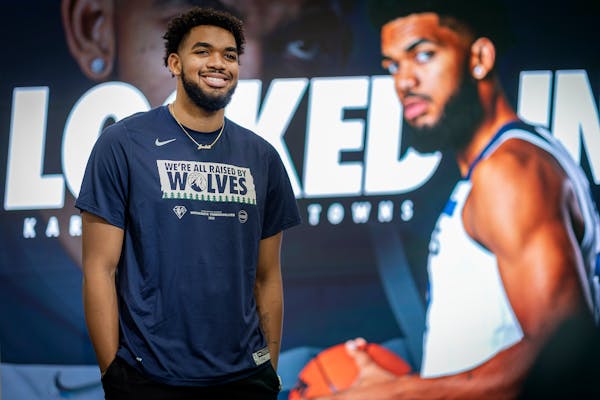He didn't ride into Target Center on a white horse Wednesday night, though Karl-Anthony Towns' introduction with the starting lineup carried a theatrical flair befitting his loooooooong-awaited return.
The ending was even more dramatic.
With the game on the line, Timberwolves coach Chris Finch put the ball in the hands of a guy who hadn't played since late November.
So much for easing back into things.
What happened next is why Towns' presence in the lineup is so important and why that pocket of fans who took to social media during his absence to say the team is better off without him peddled a nonsense narrative.
Towns delivered two made free throws with three seconds left on the clock in a triumphant return for him and his team, a 125-124 win over the Atlanta Hawks to kickstart Act III of a season that has been turned upside down almost from the beginning.
Packed tightly in a playoff race that makes every remaining game extra-important, the Wolves don't need Towns to pretend he is Superman in his reintegration to the lineup. They only need the version of himself that was on display in his return.
Towns' stat line was impressive — 22 points, four rebounds, three assists and two steals — but the optics of his performance stood out.
He played within himself. If he felt rusty, it wasn't outwardly evident. He didn't force shots or try to make up for lost time by being overaggressive. He even holstered the distracting habits that too often disrupt his performance. If he complained about a foul, it wasn't incessant. He controlled his emotions.
His 52-game absence became shrouded in mystery — unnecessarily so — by limited information provided by KAT and/or the team on his recovery timetable. The decision to offer only vague updates was their prerogative, but that approach fueled frustration for outside observers who were left to speculate and offer up theories.
The whole saga was strange.
That's over now. Towns is back and healthy, and the Wolves have eight regular-season games remaining, plus whatever happens after that, to dictate how their season ultimately gets defined.
Will they look back at this as a wasted season in their careers?
Or will being intact again — assuming Anthony Edwards returns from an ankle injury soon — enable them to salvage this weird season and create something positive to build on?
Getting Towns back was Step 1. Besides him and Edwards, the roster lacks a natural go-to scorer. Towns' injury forced Edwards to shoulder more of that responsibility after the team traded D'Angelo Russell. Losing Towns' 21-point scoring average was not a minor detail.
The timing of Towns' return squeezes the adjustment period, but adding a player of his caliber is an upgrade, not a detriment. Towns must re-establish his offensive rhythm within the framework of a team that has played a certain way since December. Roles and rotations changed in his absence.
The Wolves have an experienced lineup with smart, veteran players who understand how to adjust. Finch will likely tinker with lineups and rotations to see what works and what doesn't, but having the full roster available will be a nice problem.
"I don't think anyone feels particularly threatened by KAT coming back," Finch said. "We actually need a lot of things that he can give us on a nightly basis with his scoring, for sure, and his shooting. We haven't really had the post presence that we do when we have him out there."
Towns found the right balance between fitting back in and being forceful in his approach. He looked explosive in chasing down a loose ball and sprinting for a breakaway dunk. And he showed no hesitancy in shooting three-pointers.
His return was successful. His calf held up, he played well, the team won.
The Wolves have eight games to figure out who they are and how the pieces fit while jockeying for playoff positioning. Time is short, but getting Towns back is a good start.






